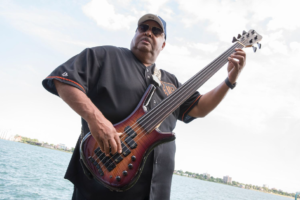
Ralphe Armstrong got an early start in the music business. In 1973, Armstrong, a 17-year old Detroit kid just out of high school, tried out for and landed a gig with John McLaughlin’s Mahavishnu Orchestra. The other person who auditioned at the same time was Jaco Pastorius. “Jaco had a different sound then, he had an old beat up fretted Fender Precision, I got the job because I played fretless,” remembers Ralphe. Ralphe was classically trained during his four years at Michigan’s Interlochen School of Fine Arts, where he studied the Josef Harvey method. Later, he transferred his acoustic technique to electric while also putting up some ferocious funk on a trio of powerful mid-70’s Mahavishnu recordings: Apocalypse, Visions of the Emerald Beyond, and Inner Worlds.
“If you’re going from the double bass to the electric, you have to know the technique in order to figure out arpeggios and come up with fingerings,” Ralphe maintains. “You can’t just look at a composition and make it musical without coming up with some kind of constructive fingering that makes it musical. That’s what I teach today.”
Following his three-year Mahavishnu stint, Armstrong joined a stellar fusion group led by violinist Jean-Luc Ponty, a former Mahavishnu bandmate who had also appeared on Apocalypse and Visions of the Emerald Beyond. Ralphe can be heard ripping it up alongside guitarists Allan Holdsworth and Daryl Stuermer and drummer Steve Smith on Ponty’s 1977 landmark Enigmatic Ocean as well as the 1978 follow-up Live, which Ralphe calls the “best example of my electric bass playing on record.” In the next few years, Ralphe went on countless gigs, tours and recording sessions with an endless list of illustrious names including Frank Zappa, Carlos Santana, Beatles producer George Martin, Herbie Hancock, Geri Allen, Lenny White, Narada Michael Walden, Earl Klugh, Eddie Harris, Don Sebesky, the London Symphony Orchestra and many, many others. An innovator and originator of fusion fretless bass, Ralphe’s unique and powerful style, as well as his technical mastery, would soon catch the attention of Gibson Guitar Corporation. He was chosen to endorse the company and serve as an advisor. He was instrumental in the development of Gibson basses known as the Ripper, G-3, RD Artist and Victory. Ralphe credits two bassists for giving him important early guidance. “Ron Carter was one of my biggest influences when I was a teenager. Whenever he came to Detroit, he would give me pointers on the bass. He and Buster Williams would always call whenever they came to town. If it weren’t for them, I might be a shoe salesman today.” In spite of being at the height of his career, Ralphe maintained a low profile for most of the 1980’s thru the 2000’s to stay home and raise his two sons and his daughter. “With all the traveling I did, my children didn’t know me so I stayed home to raise my kids,” says Armstrong. “I think that was very important; if you have children, they need to know who you are.” In those 20 years Ralphe continued to work in and around Detroit. He performed in local clubs, in theater and also taught bass at the Oberlin Conservatory in Ohio. These days, Ralphe tours, performs at various jazz venues, including the annual Detroit Jazz Festival, teaches at Cass Technical High School and Wayne State University, produces, writes and conducts bass clinics.
Ralphe Armstrong
By the time Detroit bassist Ralphe Armstrong was just 20 years old, his touring and recording accomplishments were beyond what the average musician strives a lifetime to achieve. Son of legendary visual artists musician/composer/poet/storyteller Howard “Louie Bluie” Armstrong, Ralphe came from a musical family. In 1974, 16-year old Ralphe had just finished his musical studies in classical and jazz at Michigan’s Interlochen Arts Academy. In the next few years, Ralphe went on to tour and recorded with an endless list of illustrious names including Mahavishnu Orchestra, Frank Zappa and the Mothers of Invention, Herbie Hancock, Jean-Luc Ponty, Santana and Beatles producer George Martin. Ralphe’s sophomore CD project, released in 2015, Detroit Rising is a CD that encompasses jazz, rock, fusion and the blues all rolled into one wonderful listening experience.




